Live on the homepage now!
Reader Supported News
Former NSA contractor says in interview ‘I knew it was secret … but I also knew that I had pledged service to the American people’
“I am not a traitor – I am not a spy,” Reality Winner said in an interview aired Sunday on CBS’ 60 Minutes. “I am somebody who only acted out of love for what this country stands for.”
In some of her most extensive remarks about her case since she was freed from prison last year for good behavior, Winner portrayed herself living as normal a life as possible in Texas, teaching yoga and fitness while also being a pet owner, daughter and sister named after a pun of her family’s surname and her father’s wish to have a “real winner”.
The 30-year-old also gave perhaps the most detailed account yet about the day she decided to leave her National Security Agency contractor’s office at the Fort Gordon army base in Georgia with an intelligence report about Russian attempts to meddle in the election that saw Trump beat Hillary Clinton for the White House.
Working for NSA contractor Pluribus International Corporation, Winner printed the document – labeled “TOP SECRET” – that explained how Russian military intelligence officials hacked at least one supplier of voting software and tried to break into more than 100 local election systems before the polls closed in 2016.
She tucked the report into the pantyhose underneath her dress and walked out of her office at the Fort Gordon army base in Georgia before the document became the basis of an article published on the Intercept news site.
Federal authorities announced that Winner had been arrested about an hour after that article came out. The Trump administration had her charged under the Espionage Act, which was initially created during the first world war as a means to punish people spying on the US during times of foreign conflict.
Winner pleaded guilty as part of a deal with prosecutors that called for her to be sentenced to five years in prison beginning in 2018. Authorities said the sentence was the longest ever handed down by a US federal court to someone convicted of providing government information to the media without permission.
She earned the right to an early release in June of 2021.
In Sunday’s interview, Winner said she broke her oath to protect classified material because Americans were being intentionally deceived about Russia’s efforts to sow chaos in the presidential election that vaulted Trump into the Oval Office. Winner hoped the report would end what some purported was confusion over whether or not Russia had meddled in the race that Clinton lost.
“The truth wasn’t true any more,” said Winner, who also served in the US air force between 2010 and 2016. “The public was being lied to.”
Winner said the leak “did not betray” the country’s “sources and methods” for obtaining sensitive intelligence.
“I knew it was secret,” Winner added. “But I also knew that I had pledged service to the American people. And at that point in time, it felt like they were being led astray.”
Her attorney, Alison Grinter Allen, also spoke to 60 Minutes correspondent Scott Pelley.
Allen told Pelley that her client indeed broke the law but argued that Winner’s prosecution – the first of its kind during the Trump presidency – was little more than political retribution. The lawyer also said that she would help Winner pursue a pardon because her receiving one would be “the right thing for the country”.
Winner said her imprisonment was grueling, occurring during coronavirus lockdowns and the worldwide protests ignited by the police murder of George Floyd in Minneapolis. She said she contemplated dying by suicide and stopped those thoughts solely because of her loved ones, particularly her mother, and that she’s tried to “have a sense of accomplishment in having survived prison”.
“I try so hard not to frame things as being worth it or not worth it,” Winner said. “What I know is that I’m home with my parents. And we take our lives every day moving forward as being richer in knowing what to be grateful for.”
 Former president Donald Trump in Washington on July 26. (photo: Jabin Botsford/WP)
Former president Donald Trump in Washington on July 26. (photo: Jabin Botsford/WP)
People familiar with the probe said investigators are examining the former president’s conversations and have seized phone records of top aides
Prosecutors who are questioning witnesses before a grand jury — including two top aides to Vice President Mike Pence — have asked in recent days about conversations with Trump, his lawyers, and others in his inner circle who sought to substitute Trump allies for certified electors from some states Joe Biden won, according to two people familiar with the matter. Both spoke on the condition of anonymity to discuss an ongoing investigation.
The prosecutors have asked hours of detailed questions about meetings Trump led in December 2020 and January 2021; his pressure campaign on Pence to overturn the election; and what instructions Trump gave his lawyers and advisers about fake electors and sending electors back to the states, the people said. Some of the questions focused directly on the extent of Trump’s involvement in the fake-elector effort led by his outside lawyers, including John Eastman and Rudy Giuliani, these people said.
In addition, Justice Department investigators in April received phone records of key officials and aides in the Trump administration, including his former chief of staff, Mark Meadows, according to two people familiar with the matter. That effort is another indicator of how expansive the Jan. 6 probe had become, well before the high-profile, televised House hearings in June and July on the subject.
The Washington Post and other news organizations have previously written that the Justice Department is examining the conduct of Eastman, Giuliani and others in Trump’s orbit. But the degree of prosecutors’ interest in Trump’s actions has not been previously reported, nor has the review of senior Trump aides’ phone records.
A Trump spokesman did not immediately respond to a request for comment. A Justice Department spokesman and a lawyer for Meadows both declined to comment.
The revelations raise the stakes of an already politically fraught probe involving a former president, still central to his party’s fortunes, who has survived previous investigations and two impeachments. Long before the Jan. 6 investigation, Trump spent years railing against the Justice Department and the FBI; the investigation moving closer to him will probably intensify that antagonism.
Federal criminal investigations are by design opaque, and probes involving political figures are among the most closely held secrets at the Justice Department. Many end without criminal charges. The lack of observable investigative activity involving Trump and his White House for more than a year after the Jan. 6 attack has fueled criticism, particularly from the left, that the Justice Department is not pursuing the case aggressively enough.
In trying to understand how and why Trump partisans and lawyers sought to change the outcome of the election, one person familiar with the probe said, investigators also want to understand, at a minimum, what Trump told his lawyers and senior officials to do. Any investigation surrounding the effort to undo the results of the election must navigate complex issues of First Amendment-protected political activity and when or whether a person’s speech could become part of an alleged conspiracy in support of a coup.
Many elements of the sprawling Jan. 6 criminal investigation have remained under wraps. But in recent weeks the public pace of the work has increased, with a fresh round of subpoenas, search warrants and interviews. Pence’s former chief of staff, Marc Short, and lawyer, Greg Jacob, appeared before the grand jury in downtown Washington in recent days, according to the people familiar with the investigation. Both men declined to comment.
The Justice Department efforts are separate from the inquiry underway by the House committee, which has sought to portray Trump as responsible for inciting the Capitol riot and for being derelict in his duty for refusing to stop it. Both Short and Jacob have testified before the committee, telling lawmakers that Pence resisted Trump’s attempts to enlist him in the cause.
Unlike the Justice Department, the House panel does not have the power to launch criminal investigations or charge anyone with wrongdoing.
The Justice Department probe began amid the smoke, blood and chaos at the Capitol and has led to criminal charges against more than 840 individuals, expanding to include an examination of events that occurred elsewhere in the days and weeks before the attack — including at the White House, in state capitols and at a D.C. hotel.
There are two principal tracks of the investigation that could ultimately lead to additional scrutiny of Trump, two people familiar with the situation said, also speaking on the condition of anonymity to discuss an ongoing investigation.
The first centers on seditious conspiracy and conspiracy to obstruct a government proceeding, the type of charges already filed against individuals who stormed the Capitol on Jan. 6 and on two leaders of far-right groups, Stewart Rhodes and Henry “Enrique” Tarrio, who did not breach the Capitol but were allegedly involved in planning the day’s events.
The second involves potential fraud associated with the false-electors scheme or with pressure Trump and his allies allegedly put on the Justice Department and others to falsely claim that the election was rigged and votes were fraudulently cast.
Recent subpoenas obtained by The Post show that two Arizona state legislators were ordered to turn over communications with “any member, employee, or agent of Donald J. Trump or any organization advocating in favor of the 2020 re-election of Donald J. Trump, including ‘Donald J. Trump for President, Inc.’ ”
No former president has ever been charged with a crime in the country’s history. In cases when investigators found evidence suggesting a president engaged in criminal conduct, as with Richard M. Nixon and Bill Clinton, investigators and successive administrations concluded it was better to grant immunity or forgo prosecution. One goal was to avoid appearing to use government power to punish political enemies and assure the tradition of a peaceful transfer of power.
Attorney General Merrick Garland has vowed that the Jan. 6 investigation will follow the facts wherever they lead and said that no one is exempt or above scrutiny, while refusing to divulge information outside of court filings.
Garland told NBC News in a Tuesday interview that the department pursues justice “without fear or favor. We intend to hold everyone, anyone, who was criminally responsible for the events surrounding January 6th, for any attempt to interfere with the lawful transfer of power from one administration to another, accountable — that’s what we do. We don’t pay any attention to other issues with respect to that.”
The Jan. 6 investigation is by some measures the largest ever undertaken by the Justice Department. While investigators in nearly every part of the country have been involved, the lion’s share of the work is being done by three offices: the U.S. attorney’s office in the District of Columbia, and the criminal and national security divisions at department headquarters.
In the probe’s first year, prosecutors focused largely on the people who breached the Capitol, some of them violently, charging hundreds with interfering with or assaulting police or obstructing an official proceeding.
This year, the fake-elector scheme has become a major focus of the Justice Department inquiry. After Trump lost the election, lawyers and others close to him urged GOP officials in key states to submit alternate and illegitimate slates of electors to reject the results of the state vote totals. Those would-be electors were aided in their effort by Trump campaign officials and Giuliani, who said publicly that the rival slates were necessary and appropriate, and has been described as overseeing the strategy.
Last month, federal agents fanned out in multiple states to serve grand jury subpoenas, execute search warrants and interview witnesses — a significant escalation of overt investigative activity. As part of that effort, agents searched Eastman’s electronic devices, and conducted a search at the home of Jeffrey Clark, a former Justice Department official who enthusiastically embraced some of Trump’s last-ditch efforts to stop Biden from becoming president. Many of those who received subpoenas were told specifically to turn over their communications with Giuliani.
The Justice Department inspector general is also an important player in the investigation, as it examines Clark’s role as a department official in allegedly furthering the efforts.
In a call on Dec. 27, 2020, witnesses have said, Trump told acting attorney general Jeffrey Rosen that he wanted his Justice Department to say there was significant election fraud, and said he was poised to oust Rosen and replace him with Clark, who was willing to make that assertion.
Rosen told Trump that the Justice Department could not “flip a switch and change the election,” according to notes of the conversation cited by the Senate Judiciary Committee.
“I don’t expect you to do that,” Trump responded, according to the notes. “Just say the election was corrupt and leave the rest to me and the Republican congressmen.”
The president urged Rosen to “just have a press conference.” Rosen refused. “We don’t see that,” he told Trump. “We’re not going to have a press conference.”
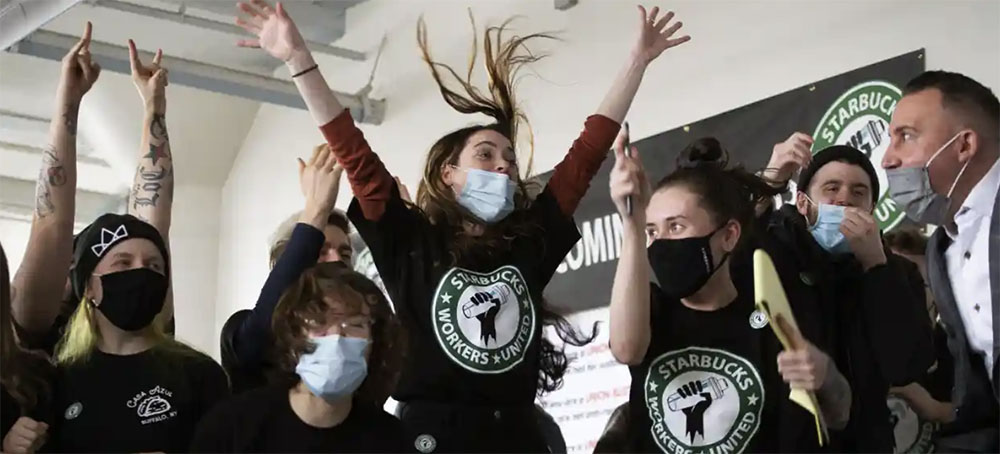 Starbucks employees celebrate after winning their election victory in Buffalo in December. (photo: Joshua Bessex/AP)
Starbucks employees celebrate after winning their election victory in Buffalo in December. (photo: Joshua Bessex/AP)
Wins for Amazon and Starbucks workers shows labor movement surging after years of decline – but pushback has been fierce
But the corporate pushback in America has been fierce, and has come amid aallegations of union-busting, and brutal campaigns to try and discourage workers from organizing.
An August 2021 poll conducted by Gallup found support for labor unions at their highest point in the US since 1965, with 68% support in the US. Labor unions were the only institution for whom Americans’ approval did not decline over the past year, in a June poll on confidence for 16 major US institutions.
During the first three-quarters of the fiscal year, the National Labor Relations reported an increase of union election petitions by 58%, up to 1,892 from 1,197.
The NLRB is now pushing for increased funding to handle the surge in labor activity. But labor law reform has not been able to get through the US Senate, despite being passed in the House.
Some of the largest US corporations and brands have seen workers organize for the first time ever.
After the first corporate-run Starbucks in the US won its union election in Buffalo in December, about 200 stores have since voted to unionize, leading the resurgence of labor union election petition filings.
These victories have come despite aggressive opposition from Starbucks.
In early June, Austin Locke, a barista at Starbucks for about six years, three at the Ditmars location in Queens, New York, alleged a manager put his hand on him over an issue with completing a Covid check-in before working his shift. He reported the incident to human resources, who he claims were dismissive and defensive.
A few weeks later, shortly after his store voted to unionize, he was informed his job was terminated over claims he did not complete the Covid check-in, and an allegation that the incident he reported to human resources over the manager was false.
Locke is in the process of filing an unfair labor practice charge with the National Labor Relations Board. He is one of several dozen workers who have done so amid a surge of union organizing at Starbucks stores.
Locke’s dismissal has incited several local groups, workers and community members to protest against his dismissal and rally public support in favor of the union organizing efforts at Starbucks.
“We’re basically out on the street every day to pass out flyers, to let everybody in the community, and the customers that come in that store – the regulars that I used to see every day – know that I was illegally fired,” added Locke.
Starbucks has denied all allegations of retaliation against workers involved in union organizing, and said there was no physical altercation between Locke and the manager.
The first Amazon warehouse won their union election in Staten Island, New York, in April last year, and union organizing campaigns have gone public at other Amazon warehouses in North Carolina, Kentucky and upstate New York.
Heather Goodall, started working at an Amazon warehouse near Albany, New York, in February. “Within a week, I was shocked at what I found. There were not enough harnesses for people, they didn’t fit, there were injuries, and it just was overwhelming,” said Goodall.
She started asking co-workers about their thoughts on forming a union, and found there was significant interest, but also fear. But that fear began to dissipate after the Staten Island warehouse won,and other workers saw her success in advocating on behalf of co-workers with their problems at Amazon.
After joining the Amazon Labor Union, the independent union that won the union election in Staten Island, Goodall is pushing to gather enough union authorization signatures to merit a union election with the National Labor Relations Board in the coming weeks. Amazon is opposing workers doing so.
Meanwhile, the first Apple retail store in the US won its union election in June. Workers at two Trader Joe’s stores, two Chipotle locations, and a Lululemon retail store have recently filed for union elections, where, if successful, they would be the first locations at these corporations to unionize.
The first REI retail store successfully unionized in New York City in March, and a second store in Berkeley, California, is holding its union election on 27 July.
Jules Gerlitz, an employee at the Berkeley store, said customers are often surprised at the lack of union representation at REI, given the company is a cooperative and brands itself as progressive.
Gerlitz said a common anti-union talking point from REI managers is to claim that a union contract does not guarantee anything, and could potentially decrease pay and benefits for workers – which Gerlitz said was an illogical argument because workers would never agree to that ever being on the negotiating table.
“REI has released information that purports to be from a neutral stance. But it’s very clearly anti-union in what it purports to do, in terms of generating this fear, or uncertainty, about all of these things,” said Gerlitz.
Shortly after the store in New York won its union election, REI corporate released a rollout of new pay and benefits company-wide, though REI has denied it was in response to the union election win.
Workers also claim managers from other stores brought in to the Berkeley store have been giving misinformation to employees about unions.
REI has denied claims of union opposition. It said managers from outside stores were brought in to support store functions and cover management time off. REI also claimed HR understaffing issues were resolved and they have no record of unaddressed complaints from the Berkeley store.
“We will fully support the petition process in Berkeley, including the right of every employee to vote for or against union representation,” said an REI spokesperson in an email.
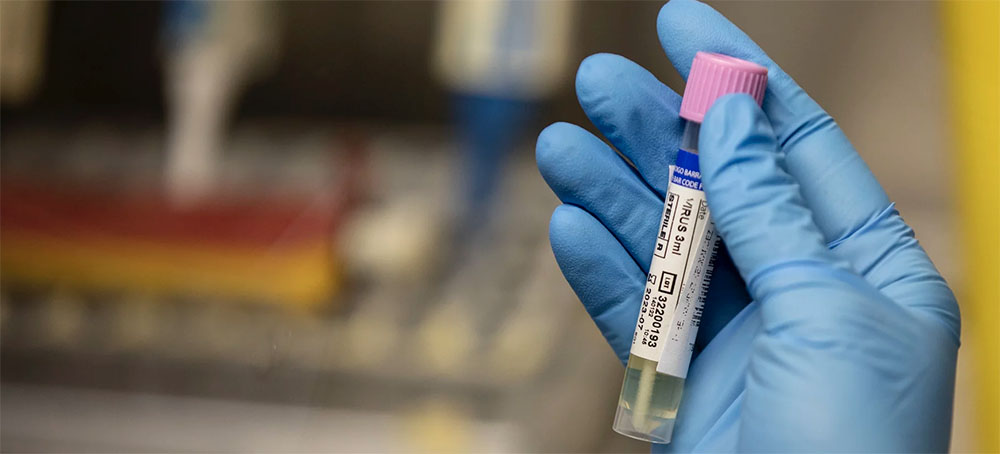 A medical laboratory technician shows a suspected monkeypox sample at the microbiology laboratory of La Paz Hospital on June 6. (photo: Pablo Blazquez Dominguez/Getty Images)
A medical laboratory technician shows a suspected monkeypox sample at the microbiology laboratory of La Paz Hospital on June 6. (photo: Pablo Blazquez Dominguez/Getty Images)
"We're losing daylight," UCLA epidemiologist Anne Rimoin, who has studied monkeypox for decades, told NPR. "Every day that we aren't continuing to push forward on all fronts, the less likely it is that we will be able to contain it."
U.S. officials have already expanded testing, made tens of thousands of vaccines available and made plans to release another 1.6 million doses in the coming months.
But the limited supplies have not matched demand, some health officials have reported. And despite limited testing, case numbers have grown so rapidly in recent weeks that a larger response may be necessary to contain the outbreak, experts say – if containment is still possible.
"It's going to be tough, but that needs to still be the goal," Dr. Preeti Malani, an infectious disease specialist at the University of Michigan, told NPR. "What we do in the coming days and weeks will really determine where we are a few months from now."
The U.S. is closing in on 3,000 cases of monkeypox
Over the weekend, the World Health Organization declared the outbreak a public health emergency. Biden administration officials have said they are discussing whether to declare an emergency in the U.S.
The discussions represent a change of tone from the beginning of the outbreak in May. Then, there were only a handful of cases outside of Africa, where the disease is endemic, and health officials in the U.S. and around the world expressed confidence that the disease was containable.
As of Friday afternoon, the CDC had reported 2,891 cases of monkeypox in the U.S. – a number more than 10 times higher than a month ago.
The CDC had tests available before this outbreak began – a significant difference from COVID-19 – but experts have complained that the agency is testing cases at too slow a pace. The Biden administration began shipping tests to commercial laboratories in late June, with the expectation that testing capacity would be "ramped up" through the month of July.
"We are way behind in a lot of aspects, including rapid testing and access to treatment for those patients who might need treatment," Malani said.
More robust contact tracing, too, could help combat the virus.
"Ultimately, we cannot vaccinate and treat our way out of monkeypox," Malani said. "Prevention is critical."
Monkeypox has a long incubation period, she said. After an initial exposure, it can be weeks before symptoms develop. An early heads-up from a robust contact tracing effort could help people exposed to monkeypox isolate and seek tests or vaccines before symptoms appear.
The virus most often spreads through prolonged physical contact. It is not a sexually transmitted disease; it can spread through non-sexual physical contact, or by handling clothes or bedding used by an infected person. The disease can also spread via respiratory droplets.
Like in other Western countries, the outbreak in the U.S. has mostly affected men who have sex with other men. But the CDC has also reported infections in a small number of cisgender women. And on Friday, the agency announced the outbreak's first documented cases in children – a toddler in California and an infant whose family was traveling in Washington, D.C.
Lessons from COVID-19
The monkeypox outbreak arrived at a time when public awareness of infectious disease is high, experts pointed out. The COVID pandemic has made Americans familiar with public health concepts like isolation, rapid testing and contact tracing.
But other lessons from COVID have seemingly not stuck – like how early and how forcefully to take action when an outbreak is still constrained to a handful of people.
"I hate to say this, but I feel like 'here we go again,'" Rebecca Fischer, an infectious disease specialist at Texas A…M University, told NPR.
Researchers are quick to point out that the two diseases are very different. They belong to different families of virus and require different levels of contact to spread. Overall, COVID is more transmissible.
Many of COVID's lessons could be applied to any infectious disease, Fischer said.
"Public health thought that we had learned this great thing – that we need to respond aggressively up front, and with a lot of resources and a lot of attention up front, if we hope to curtail and contain," Fischer said. "And I get the sense that sort of aggressive upfront action didn't really happen."
Still, public health officials and epidemiologists alike say that containment could be within reach.
Unlike COVID, monkeypox was already a known quantity to researchers before the current outbreak. The disease was first discovered in humans more than 50 years ago, and its similarity to smallpox means smallpox treatments and vaccines are also effective against monkeypox. The U.S. has millions of doses already stockpiled.
"I absolutely think that it can be contained. But whether it will be depends upon the resources dedicated to doing this and the speed with which we can act," said Rimoin of UCLA. "It really will require a major concerted effort locally, nationally and globally."
Republicans have opposed renewing COVID funding as new variants continue to emerge and public health is consistently underfunded on a local level.
There was a recent case of POLIO - generations don't even know what POLIO is, but has the potential for spreading since the incubation period is 30 days.
Ghana is reporting cases of MARBURG.
Public Health services need to be united and appropriately funded to protect us.
This is not solely MONKEYPOX, but the public health potential of additional threats that we need to adequately understand with timely scientific information.
Let's remember that tRump fired CDC scientists in China.
A scientifically uninformed leader does not bode well for the nation.
excerpts:
Exclusive: U.S. slashed CDC staff inside China prior to coronavirus outbreak
WASHINGTON(Reuters) - The Trump administration cut staff by more than two-thirds at a key U.S. public health agency operating inside China, as part of a larger rollback of U.S.-funded health and science experts on the ground there leading up to the coronavirus outbreak, Reuters has learned.
The CDC’s China headcount has shrunk to around 14 staffers, down from approximately 47 people since President Donald Trump took office in January 2017, the documents show. The four people, who spoke on condition of anonymity, said the losses included epidemiologists and other health professionals.
The material reviewed by Reuters shows a breakdown of how many American and local Chinese employees were assigned there. The documents are the CDC’s own descriptions of its headcount, which it posts online. Reuters was able to search past copies of the material to confirm the decline described by the four people.
“The CDC office in Beijing is a shell of its former self,” said one of the people, a U.S. official who worked in China at the time of the drawdown.
Separately, the National Science Foundation (NSF) and the United States Agency for International Development (USAID), the global relief program which had a role in helping China monitor and respond to outbreaks, also shut their Beijing offices on Trump’s watch. Before the closures, each office was staffed by a U.S. official. In addition, the U.S. Department of Agriculture(USDA) transferred out of China in 2018 the manager of an animal disease monitoring program.
https://www.reuters.com/article/us-health-coronavirus-china-cdc-exclusiv-idUSKBN21C3N5
excerpts:
Trump disbanded NSC pandemic unit that experts had praised
Public health and national security experts shake their heads when President Donald Trump says the coronavirus "came out of nowhere" and “blindsided the world.”
WASHINGTON -- Public health and national security experts shake their heads when President Donald Trump says the coronavirus "came out of nowhere" and “blindsided the world.”
They've been warning about the next pandemic for years and criticized the Trump administration's decision in 2018 to dismantle a National Security Council directorate at the White House charged with preparing for when, not if, another pandemic would hit the nation.
“It would be nice if the office was still there,” Dr. Anthony Fauci, the director of the National Institute of Allergy and Infectious Diseases at the National Institute of Health, told Congress this week. “I wouldn't necessarily characterize it as a mistake (to eliminate the unit). I would say we worked very well with that office.”
The NSC directorate for global health and security and bio-defense survived the transition from President Barack Obama to Trump in 2017.
Trump's elimination of the office suggested, along with his proposed budget cuts for the CDC, that he did not see the threat of pandemics in the same way that many experts in the field did.
“One year later I was mystified when the White House dissolved the office, leaving the country less prepared for pandemics like COVID-19,” Beth Cameron, the first director of the unit, wrote in an op-ed Friday in The Washington Post.
She said the directorate was set up to be the “smoke alarm" and get ahead of emergencies and sound a warning at the earliest sign of fire — "all with the goal of avoiding a six-alarm fire."
https://abcnews.go.com/Politics/wireStory/trump-disbanded-nsc-pandemic-unit-experts-praised-69594177
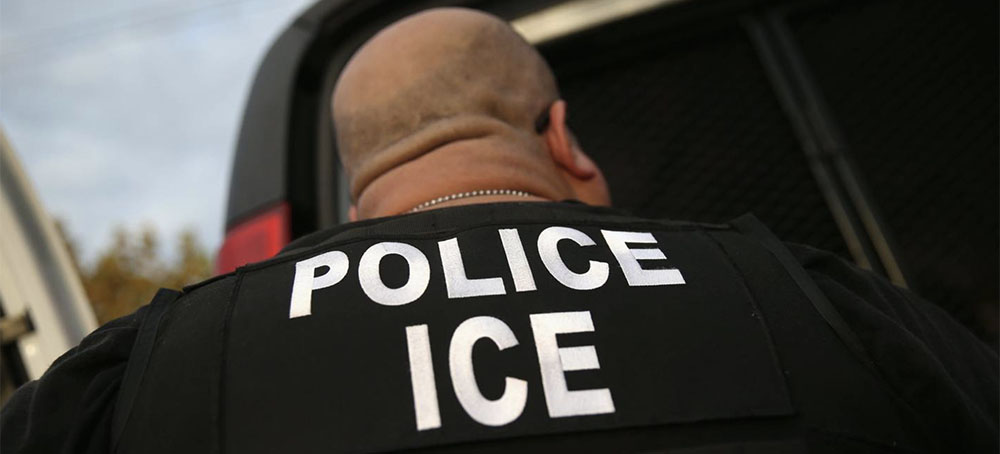 Breaking the ICE precedent. (photo: John Moore/Getty Images)
Breaking the ICE precedent. (photo: John Moore/Getty Images)
Yet our highest court exercises its power in other ways, primarily through procedural orders. Last week, in a 5-4 decision largely along ideological lines (Justice Amy Coney Barrett broke from her usual bloc, joining Justices Sonia Sotomayor, Elena Kagan and Ketanji Brown Jackson), the court refused to stay a lower court injunction that had prevented the Biden administration from enacting ICE enforcement guidelines issued last year. The court said it would hear the merits of the case at the end of this year.
This leaves in place an untenable situation: A single federal district judge in Texas is forcing the entire federal immigration enforcement efforts nationwide to have absolutely no prioritization whatsoever. Biden’s Department of Homeland Security had sanely sought to concentrate its energies on detention of recent border crossers and those posing a threat to public safety or national security. The judge thwarted that policy choice, which means now a hardworking undocumented mother raising her U.S.-born kids in Queens must be targeted exactly the same as an admitted terrorism supporter or child sexual offender.
Every single law enforcement agency in the history of the United States — local, state and federal — exercises discretion daily. The government does not have the resources to go after the 11 million undocumented people in communities around the country, and even if it did, doing so would cause us social, economic and moral ruin.
This nonsensical directive keeps no one safe, is inhumane and is particularly galling given the top court’s frequent knocking down of district court injunctions against Trump-era restrictive immigration policies. It’s part and parcel with justices’ increasing willingness to be political actors, the precedent be damned.
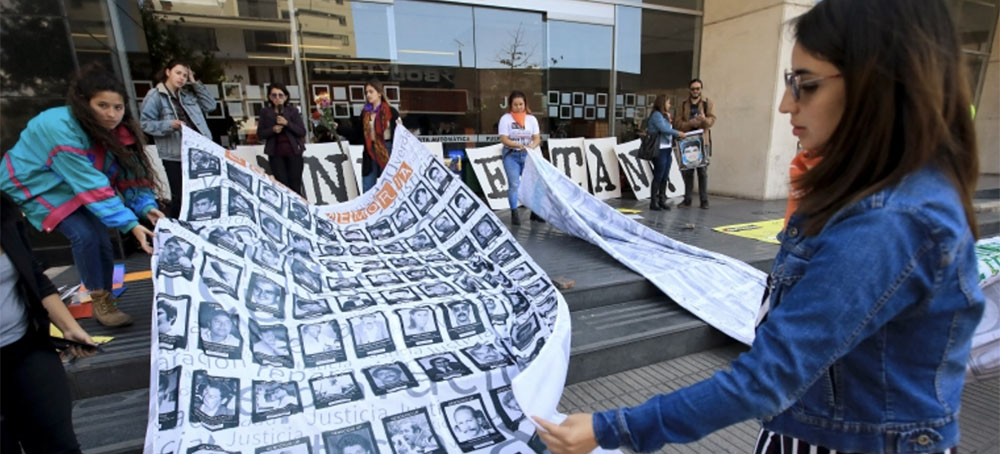 People demonstrate against the 'false positives' in front of the Special Jurisdiction for Peace in Bogota. (photo: AFP)
People demonstrate against the 'false positives' in front of the Special Jurisdiction for Peace in Bogota. (photo: AFP)
The murders allegedly represent ‘false positives,’ civilians killed by the army and presented as fighters.
The murders form part of what is known in Colombia as “false positives”, where the military killed civilians and then presented them as fighters to try to inflate the effectiveness of their fight against rebels. In return, the soldiers received special benefits such as help to gain promotion.
The Special Jurisdiction for Peace (JEP) said on Monday it had gathered enough evidence to charge 19 soldiers, an intelligence agent and two civilians for the murders and forced disappearance of hundreds of people in the eastern Casanare department.
A general and five colonels, all now retired, are among the accused.
‘Criminal organisation’
The tribunal’s magistrates said the soldiers belonged to the 16th Brigade, in which “a criminal organisation” killed and falsely presented civilians as fighters and criminals that “had fallen in combat”.
Some victims had been plied with alcohol and drugs.
In return for their crimes, the soldiers received “permits, special food, holiday plans, training classes abroad and recognition” to accelerate their promotion.
From 2002 to 2008, under the right-wing presidency of Alvaro Uribe, Colombia’s military committed more than 6,400 murders, according to the JEP.
The accused must either accept or reject the charges in the coming weeks. If they confess and make reparations to their victims, they can avoid prison time. Otherwise, they face up to 20 years in jail.
The JEP was set up following the 2016 peace deal that brought to an end more than a half century of conflict between the state and the Revolutionary Armed Forces of Colombia (FARC), which has since formed a political party.
The tribunal investigates atrocities committed by both sides in the conflict.
In June, the former FARC leadership took responsibility for its actions and apologised to its victims.
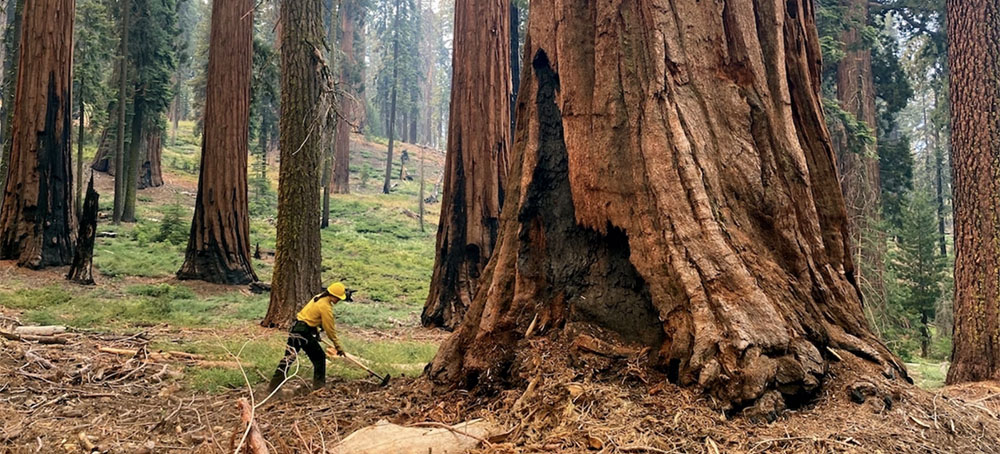 Forest service. (photo: Garrett Dickman/National Park Service/AP)
Forest service. (photo: Garrett Dickman/National Park Service/AP)
In the past two years, nearly 20 percent of the iconic trees have been destroyed by wildfire.
The move allows the Forest Service to immediately thin the forest in and around giant sequoia groves by removing brush and smaller trees and conducting prescribed burns using the agency’s emergency authority.
Over the past two years, massive conflagrations have killed nearly 20 percent of the ancient trees. “Without urgent action, wildfires could eliminate countless more iconic giant sequoias,” Randy Moore, the Forest Service’s chief, said in a news release.
The Forest Service plans to begin clearing brush and smaller trees from 13,000 acres of national forest to protect 12 giant sequoia groves this summer. Using its emergency authority under the National Environmental Policy Act, the agency can start the work without a full environmental review, which can take over a year to complete.
Giant sequoias, a close relative of redwoods, are the largest tree in the world by volume. They can live for more than 3,000 years and are found only on the western slopes of California’s Sierra Nevada mountains.
The trees are adapted to fire — they have thick, spongy bark that protects them from the flames and the heat actually releases the seeds from their cones, allowing young trees to take root in areas cleared by fires.
But today’s fires are much different from wildfires of the past. Climate change has led to hotter temperatures, severe drought, a year-round fire season, and the proliferation of bark beetles, which have killed millions of drought-weakened trees and allowed them to pile up on the forest floor.
On top of these changes, for more than a century, the policy has been to put out wildfires as quickly as possible, creating unnaturally dense forests and allowing brush and dead wood to accumulate. These factors have combined to enable out-of-control blazes to explode across California in recent years. The bigger, hotter fires are more likely to reach giant sequoias’ crowns, killing them.
Proper management can help. Earlier this month the Washburn Fire menaced Yosemite National Park’s Mariposa Grove, but regular prescribed burns to clear hazardous fuels slowed the inferno enough that firefighters were able to protect the giant sequoias. Ecologists expect all to survive.
The Oak Fire, which started on Friday afternoon, is currently burning southwest of the park in the foothills of the Sierra Nevada.
Follow us on facebook and twitter!
PO Box 2043 / Citrus Heights, CA 95611

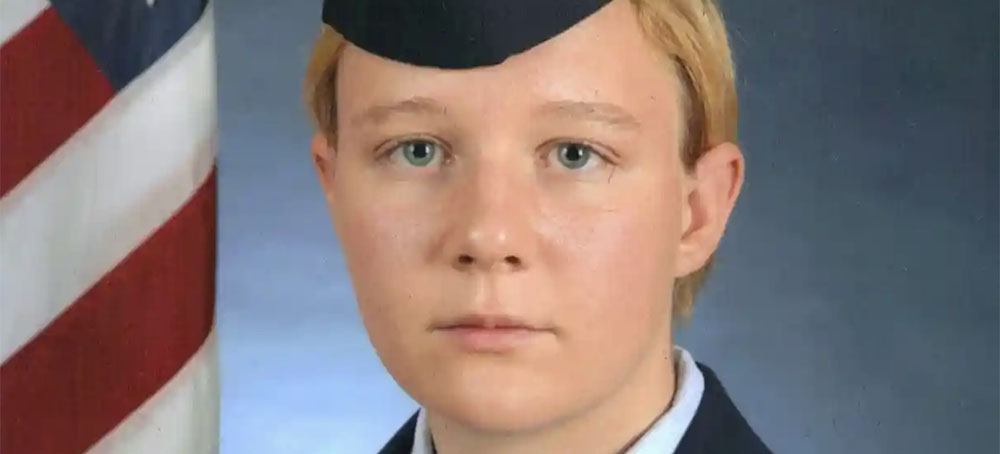

No comments:
Post a Comment
Note: Only a member of this blog may post a comment.